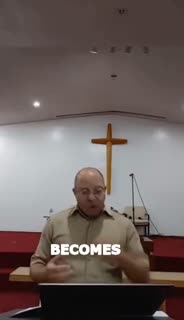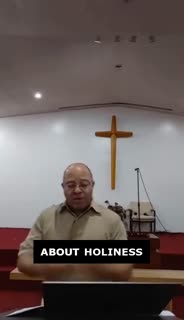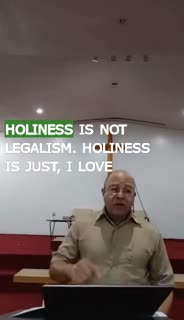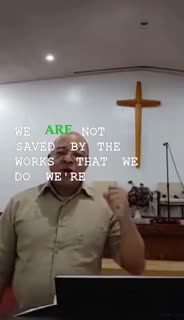Embracing Holiness: A Journey of Transformation and Worship
Devotional
Sermon Summary
Bible Study Guide
Sermon Clips
1. "Holiness becomes something that is beautiful, it's something that we want to attain to, it's something that we want to have. It's like an adornment. And so, one of the things we take a look at is that many times people look at holiness as something that's a doctrine to, restrict people from what they want to do, and going where they want to go, and that's not the really, the teaching of holiness. It's, God calls it, in 1 Chronicles 16 and 29, the beauty of holiness." ([00:02:29] (29 seconds)
)
2. "We are to give God glory, submit to God the eternal you and one of the parts of this adornment of holiness is separation we are separated from the world in the sense of uh may God making a distinction to where we're now we are holy we are the ecclesia we are the peculiar people the royal priesthood we are different why because if any man being Christ he is a new creature an old thing that passed away both all things are become new and so we have this separation and I know that we're going to talk about holiness and we're going to talk about holiness and I know this is hard for a lot of times the people begin to really serve God but when we give ourselves to God and we enter into a relationship with God the work he's doing on the inside it begins to show on the outside." ([00:05:15] (47 seconds)
)
3. "Holiness is not requirements. Holiness is that I'm now a servant of God, and I want to bow down to him, and in gratitude, I want to live my life according to his word. And so before we begin to talk about holiness as external, we have to talk about holiness internal. You must be born again. And so Luke 9 and 62 says, And Jesus said unto him, No man, having put his hand to the plow, looking back, is fit for the kingdom of God. Now, we give ourselves unto God. This is going to be a work we have to do. It's called sanctification." ([00:07:09] (36 seconds)
)
4. "When we talk about holiness and living for God and separation from the world and wanting to do right, and those that reject that really aren't sure of the appreciation for the salvation that God's done in their life. When you really look at all he's done for you and say, God, I appreciate your dying on the cross. I appreciate you going to hell for me. I appreciate your forgiveness. I appreciate your forgiveness of all the sin that I've done. I appreciate being there for me and picking me up, God, and planting me on solid ground. God, I'm thankful for that. And so we want to do right." ([00:09:32] (30 seconds)
)
5. "Holiness is not legalism. Holiness is just, I love Jesus, and I want to live for him. Legalism, according to the Pharisees, were to exude spirituality while they camouflaged their desire for sin on the inside. The Pharisees were not trying to live for God. The Pharisees were not trying to go closer to God, but they definitely wanted people to acknowledge their spirituality and lift them up, if you will, in religiosity." ([00:12:16] (29 seconds)
)
6. "We are not saved by the works that we do, we're saved by his grace and so when we talk about being separated and loving God nobody's going to come and take you out of the club nobody's going to come and snatch you out of the bar room if you're in a in an activity uh where it is really glorifying the devil and sin nobody's going to come in there the angels are going to come and snatch you out of there because you have choice you can choose to be in that if you want to however when you give yourself to God and you realize all that God did for you how he died on the cross and the pain that he went through using he did not die in vain I am going to live for God and so you choose not to go into the club you choose to go away from the place of the sin why because you love God." ([00:15:37] (46 seconds)
)
7. "There is this thing called sanctification we are learning to live for God every single day and as we learn to live for God we have to study the word of God now there's going to be different ways that you can learn holiness standards number one is biblical standards and so as we go through the word of God and we're seeing different than the God's teaching then we begin to understand what God's calling us to do that sometimes we're going to have a church standards this is the way uh the church leadership is telling us that we encourage us to live a certain way and because we are under a certain ministry uh we live that way." ([00:17:12] (35 seconds)
)
8. "The more you fall in love with God the more you begin to search out a matter one of the things they hear from a lot of times people that are young in God that have been around in church for a long time now just because you've been around in church for 10 years 20 years 30 years doesn't mean that you're mature in Christ it just means you've been around for a long time but one of the that i hear from people that have been around for a while but are still growing into that maturity that God wants them to get to is that uh I've never seen that I've never done that and and I look at just because you've never done it before this way search out the scriptures and find out for yourself." ([00:21:10] (37 seconds)
)
9. "When I preach holiness, when I tell people about God, they are quick to say, no, that's not how I want to live. I don't see it that way. But they've never searched the scriptures. Hopefully that makes sense. A lot of times people really are not looking as much as they need to. Now, the word of God says it was 2 Timothy 2 and 15, study to show yourself approved. The word of the need is not to be shamed, rightly dividing the word of truth. We're told to study. You can't expect your pastor to do a 20 -minute sermon on Sunday morning, or 20 minutes, 30 minutes, whatever we may do, and really give you everything that you need for all week long." ([00:22:53] (40 seconds)
)
10. "Pray and then humble ourselves before God and then we trust and the one that God is sending us to for Romans 10 14 says how then shall they call on him in whom they have not believed and how should they believe in him of whom they have not heard and how shall they hear without a preacher God's going to send you a teacher God's going to give you somebody to teach the word of God and as God gives you that person then you have to learn to work with them and trust them that takes a long while because I know everybody walks through those doors I may be reverend talker but I may not be their pastor and then over a period of time as God began to deal with their heart about things." ([00:29:24] (47 seconds)
)
Ask a question about this sermon
)
2. "We are to give God glory, submit to God the eternal you and one of the parts of this adornment of holiness is separation we are separated from the world in the sense of uh may God making a distinction to where we're now we are holy we are the ecclesia we are the peculiar people the royal priesthood we are different why because if any man being Christ he is a new creature an old thing that passed away both all things are become new and so we have this separation and I know that we're going to talk about holiness and we're going to talk about holiness and I know this is hard for a lot of times the people begin to really serve God but when we give ourselves to God and we enter into a relationship with God the work he's doing on the inside it begins to show on the outside." ([00:05:15] (47 seconds)
)
3. "Holiness is not requirements. Holiness is that I'm now a servant of God, and I want to bow down to him, and in gratitude, I want to live my life according to his word. And so before we begin to talk about holiness as external, we have to talk about holiness internal. You must be born again. And so Luke 9 and 62 says, And Jesus said unto him, No man, having put his hand to the plow, looking back, is fit for the kingdom of God. Now, we give ourselves unto God. This is going to be a work we have to do. It's called sanctification." ([00:07:09] (36 seconds)
)
4. "When we talk about holiness and living for God and separation from the world and wanting to do right, and those that reject that really aren't sure of the appreciation for the salvation that God's done in their life. When you really look at all he's done for you and say, God, I appreciate your dying on the cross. I appreciate you going to hell for me. I appreciate your forgiveness. I appreciate your forgiveness of all the sin that I've done. I appreciate being there for me and picking me up, God, and planting me on solid ground. God, I'm thankful for that. And so we want to do right." ([00:09:32] (30 seconds)
)
5. "Holiness is not legalism. Holiness is just, I love Jesus, and I want to live for him. Legalism, according to the Pharisees, were to exude spirituality while they camouflaged their desire for sin on the inside. The Pharisees were not trying to live for God. The Pharisees were not trying to go closer to God, but they definitely wanted people to acknowledge their spirituality and lift them up, if you will, in religiosity." ([00:12:16] (29 seconds)
)
6. "We are not saved by the works that we do, we're saved by his grace and so when we talk about being separated and loving God nobody's going to come and take you out of the club nobody's going to come and snatch you out of the bar room if you're in a in an activity uh where it is really glorifying the devil and sin nobody's going to come in there the angels are going to come and snatch you out of there because you have choice you can choose to be in that if you want to however when you give yourself to God and you realize all that God did for you how he died on the cross and the pain that he went through using he did not die in vain I am going to live for God and so you choose not to go into the club you choose to go away from the place of the sin why because you love God." ([00:15:37] (46 seconds)
)
7. "There is this thing called sanctification we are learning to live for God every single day and as we learn to live for God we have to study the word of God now there's going to be different ways that you can learn holiness standards number one is biblical standards and so as we go through the word of God and we're seeing different than the God's teaching then we begin to understand what God's calling us to do that sometimes we're going to have a church standards this is the way uh the church leadership is telling us that we encourage us to live a certain way and because we are under a certain ministry uh we live that way." ([00:17:12] (35 seconds)
)
8. "The more you fall in love with God the more you begin to search out a matter one of the things they hear from a lot of times people that are young in God that have been around in church for a long time now just because you've been around in church for 10 years 20 years 30 years doesn't mean that you're mature in Christ it just means you've been around for a long time but one of the that i hear from people that have been around for a while but are still growing into that maturity that God wants them to get to is that uh I've never seen that I've never done that and and I look at just because you've never done it before this way search out the scriptures and find out for yourself." ([00:21:10] (37 seconds)
)
9. "When I preach holiness, when I tell people about God, they are quick to say, no, that's not how I want to live. I don't see it that way. But they've never searched the scriptures. Hopefully that makes sense. A lot of times people really are not looking as much as they need to. Now, the word of God says it was 2 Timothy 2 and 15, study to show yourself approved. The word of the need is not to be shamed, rightly dividing the word of truth. We're told to study. You can't expect your pastor to do a 20 -minute sermon on Sunday morning, or 20 minutes, 30 minutes, whatever we may do, and really give you everything that you need for all week long." ([00:22:53] (40 seconds)
)
10. "Pray and then humble ourselves before God and then we trust and the one that God is sending us to for Romans 10 14 says how then shall they call on him in whom they have not believed and how should they believe in him of whom they have not heard and how shall they hear without a preacher God's going to send you a teacher God's going to give you somebody to teach the word of God and as God gives you that person then you have to learn to work with them and trust them that takes a long while because I know everybody walks through those doors I may be reverend talker but I may not be their pastor and then over a period of time as God began to deal with their heart about things." ([00:29:24] (47 seconds)
)










